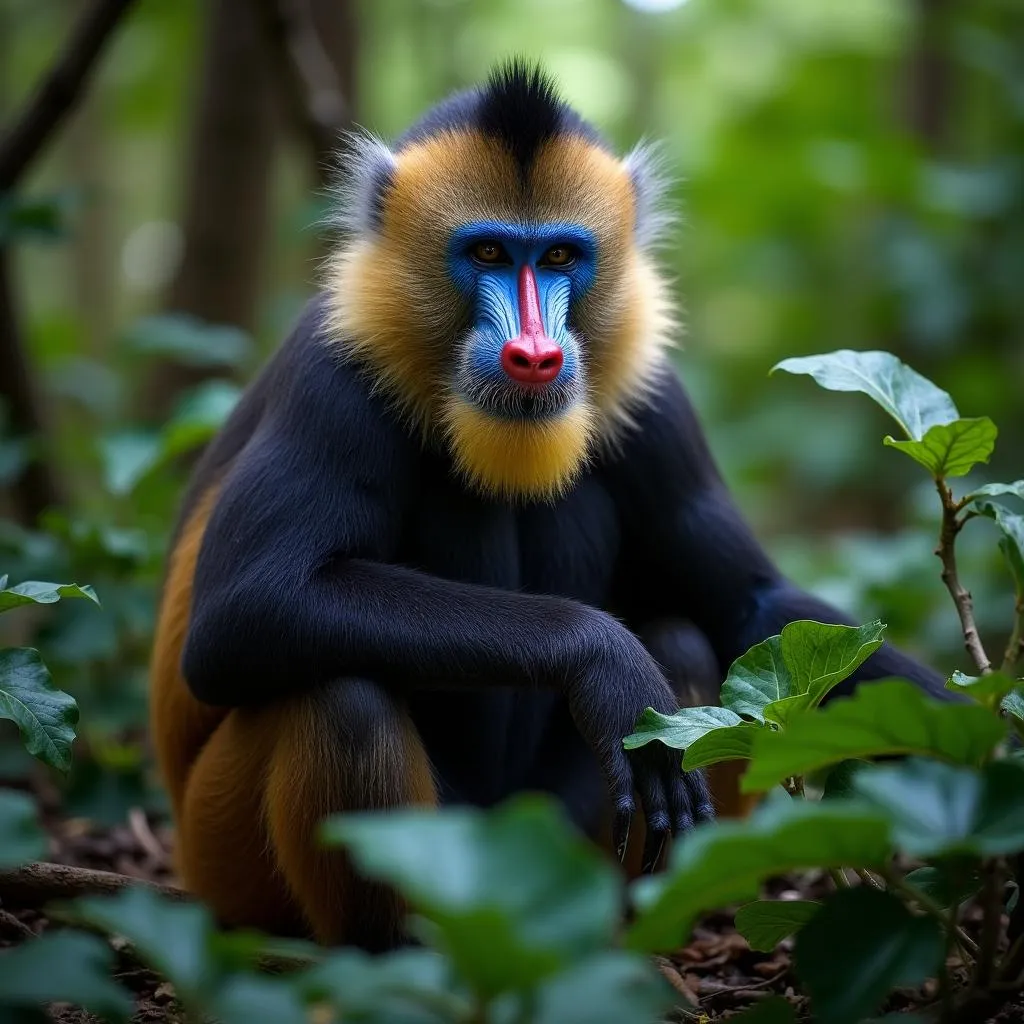African Grey Parrot Closing Eyes While Sitting: Decoding the Meaning
When your African grey parrot closes its eyes while sitting, it can leave you wondering what’s going on in that feathered head. This seemingly simple act can have a variety of meanings, from pure contentment to subtle signs of illness. Understanding these nuances is crucial for any African grey owner.
Why Does My African Grey Close Its Eyes?
An African grey closing its eyes doesn’t always mean the same thing. Just like humans, these intelligent birds use body language to communicate, and their eye behavior is a key part of that. Here are some common reasons why your African grey might be exhibiting this behavior:
-
Relaxation and Contentment: Perhaps the most common reason, a closed-eye African grey often signifies a relaxed and happy bird. If your parrot is perched comfortably, feathers slightly ruffled, and gently closing its eyes, it’s likely enjoying a moment of peace. This is similar to a cat purring or a dog sighing contentedly.
-
Napping: African greys need their sleep, just like us. If your bird closes its eyes for extended periods, especially during the day, it might simply be taking a nap. Observe its breathing – slow and regular breaths suggest a peaceful slumber.
-
Processing Information: These highly intelligent birds require time to process information and experiences. Closing their eyes can be a way for them to focus and consolidate new learnings. Think of it as their version of quiet contemplation.
-
Sunbathing: African greys enjoy basking in the sun, and they may close their eyes to protect them from the bright light. This is especially true if they are also fluffing their feathers and spreading their wings.
-
Trust and Bonding: Closing eyes in your presence can also indicate a deep level of trust and bonding. Your parrot feels safe and secure enough to let its guard down, literally. This is a significant sign of a strong bond between you and your feathered companion.
-
Discomfort or Illness: While less common, closed eyes can sometimes indicate a problem. If accompanied by other symptoms like fluffed feathers, lethargy, loss of appetite, or changes in droppings, consult an avian veterinarian immediately. Early intervention is crucial for addressing any potential health issues.
Understanding Your Parrot’s Body Language
Beyond closing their eyes, African greys communicate through a complex array of body language cues. Paying attention to these subtle signals can help you better understand your parrot’s emotional state and needs.
- Tail Wagging: Similar to dogs, tail wagging can express happiness and excitement.
- Head Bobbing: A gentle head bob can indicate contentment, while more vigorous bobbing might signal a desire for attention or play.
- Pinning Eyes: Dilated pupils accompanied by pinning eyes (rapidly constricting and dilating) can signal excitement, fear, or aggression.
Is My African Grey Sleeping or Sick?
Differentiating between a sleeping parrot and a sick one can be tricky. Here’s a quick guide to help you distinguish:
- Sleeping: Relaxed posture, slow, regular breathing, occasional slight movements.
- Sick: Fluffed feathers, lethargy, hunched posture, labored breathing, loss of appetite, changes in droppings.
What Should I Do If My African Grey Is Always Closing Its Eyes?
If your African grey is frequently closing its eyes and you’re unsure of the reason, consult an avian veterinarian. They can rule out any medical concerns and provide tailored advice based on your parrot’s individual needs.
Conclusion: Observing Your African Grey’s Behavior
Understanding why your African grey closes its eyes while sitting requires careful observation and an understanding of their complex body language. While it often signifies contentment and relaxation, it’s crucial to be aware of other potential meanings, including illness. By paying close attention to your parrot’s behavior and seeking professional advice when needed, you can ensure your feathered friend’s well-being and strengthen your bond.
FAQ
-
Is it normal for African greys to close their eyes frequently? Yes, it can be normal, especially if they are relaxing or napping. However, excessive eye closing combined with other symptoms could indicate a problem.
-
How can I tell if my African grey is sleeping or sick? Sleeping parrots exhibit a relaxed posture and slow, regular breathing. Sick parrots may show fluffed feathers, lethargy, and changes in droppings.
-
Should I be concerned if my African grey closes its eyes when I approach? Not necessarily. It can be a sign of trust and bonding. However, observe for other body language cues to understand the context.
-
How much sleep does an African grey need? African greys typically need 10-12 hours of sleep per night.
-
Can I wake my African grey if it’s sleeping? It’s best to avoid disturbing a sleeping parrot unless absolutely necessary.
-
My African grey is closing its eyes and bobbing its head. What does this mean? This combination often indicates contentment and relaxation.
-
What should I do if my African grey is closing its eyes and seems unwell? Consult an avian veterinarian immediately.
Further Questions and Resources
If you have further questions about your African Grey’s behaviour, you can find additional information on our website or contact us directly.
Need Help?
When you need support, please contact us at Phone: +255768904061, Email: kaka.mag@gmail.com, or visit us at Mbarali DC Mawindi, Kangaga, Tanzania. We have a 24/7 customer service team.

